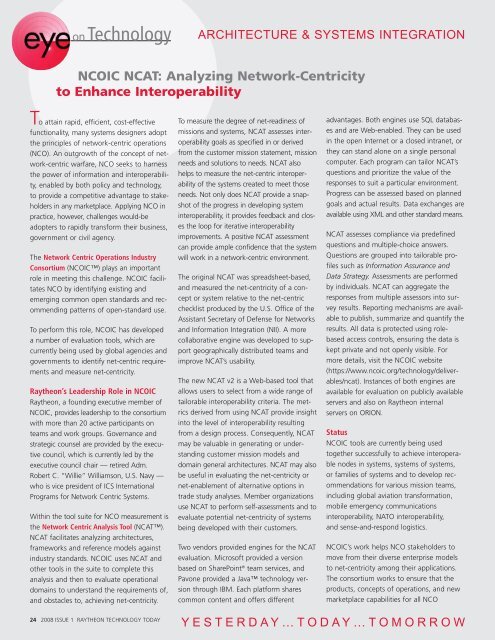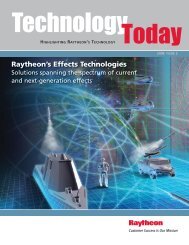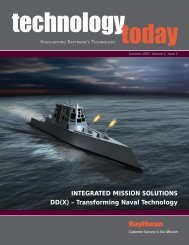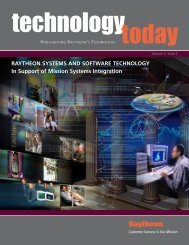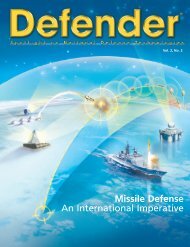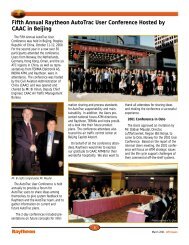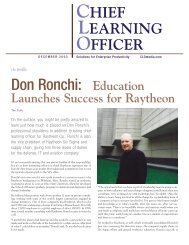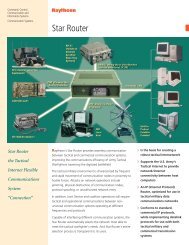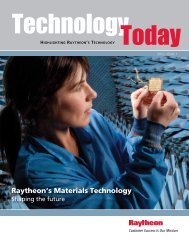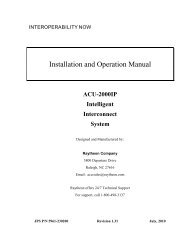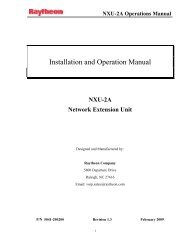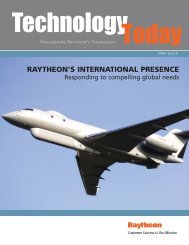Technology Today issue 1 2008 - Raytheon
Technology Today issue 1 2008 - Raytheon
Technology Today issue 1 2008 - Raytheon
Create successful ePaper yourself
Turn your PDF publications into a flip-book with our unique Google optimized e-Paper software.
on<strong>Technology</strong><br />
NCOIC NCAT: Analyzing Network-Centricity<br />
to Enhance Interoperability<br />
To attain rapid, efficient, cost-effective<br />
functionality, many systems designers adopt<br />
the principles of network-centric operations<br />
(NCO). An outgrowth of the concept of network-centric<br />
warfare, NCO seeks to harness<br />
the power of information and interoperability,<br />
enabled by both policy and technology,<br />
to provide a competitive advantage to stakeholders<br />
in any marketplace. Applying NCO in<br />
practice, however, challenges would-be<br />
adopters to rapidly transform their business,<br />
government or civil agency.<br />
The Network Centric Operations Industry<br />
Consortium (NCOIC) plays an important<br />
role in meeting this challenge. NCOIC facilitates<br />
NCO by identifying existing and<br />
emerging common open standards and recommending<br />
patterns of open-standard use.<br />
To perform this role, NCOIC has developed<br />
a number of evaluation tools, which are<br />
currently being used by global agencies and<br />
governments to identify net-centric requirements<br />
and measure net-centricity.<br />
<strong>Raytheon</strong>’s Leadership Role in NCOIC<br />
<strong>Raytheon</strong>, a founding executive member of<br />
NCOIC, provides leadership to the consortium<br />
with more than 20 active participants on<br />
teams and work groups. Governance and<br />
strategic counsel are provided by the executive<br />
council, which is currently led by the<br />
executive council chair — retired Adm.<br />
Robert C. “Willie” Williamson, U.S. Navy —<br />
who is vice president of ICS International<br />
Programs for Network Centric Systems.<br />
Within the tool suite for NCO measurement is<br />
the Network Centric Analysis Tool (NCAT).<br />
NCAT facilitates analyzing architectures,<br />
frameworks and reference models against<br />
industry standards. NCOIC uses NCAT and<br />
other tools in the suite to complete this<br />
analysis and then to evaluate operational<br />
domains to understand the requirements of,<br />
and obstacles to, achieving net-centricity.<br />
24 <strong>2008</strong> ISSUE 1 RAYTHEON TECHNOLOGY TODAY<br />
ARCHITECTURE & SYSTEMS INTEGRATION<br />
To measure the degree of net-readiness of<br />
missions and systems, NCAT assesses interoperability<br />
goals as specified in or derived<br />
from the customer mission statement, mission<br />
needs and solutions to needs. NCAT also<br />
helps to measure the net-centric interoperability<br />
of the systems created to meet those<br />
needs. Not only does NCAT provide a snapshot<br />
of the progress in developing system<br />
interoperability, it provides feedback and closes<br />
the loop for iterative interoperability<br />
improvements. A positive NCAT assessment<br />
can provide ample confidence that the system<br />
will work in a network-centric environment.<br />
The original NCAT was spreadsheet-based,<br />
and measured the net-centricity of a concept<br />
or system relative to the net-centric<br />
checklist produced by the U.S. Office of the<br />
Assistant Secretary of Defense for Networks<br />
and Information Integration (NII). A more<br />
collaborative engine was developed to support<br />
geographically distributed teams and<br />
improve NCAT’s usability.<br />
The new NCAT v2 is a Web-based tool that<br />
allows users to select from a wide range of<br />
tailorable interoperability criteria. The metrics<br />
derived from using NCAT provide insight<br />
into the level of interoperability resulting<br />
from a design process. Consequently, NCAT<br />
may be valuable in generating or understanding<br />
customer mission models and<br />
domain general architectures. NCAT may also<br />
be useful in evaluating the net-centricity or<br />
net-enablement of alternative options in<br />
trade study analyses. Member organizations<br />
use NCAT to perform self-assessments and to<br />
evaluate potential net-centricity of systems<br />
being developed with their customers.<br />
Two vendors provided engines for the NCAT<br />
evaluation. Microsoft provided a version<br />
based on SharePoint ® team services, and<br />
Pavone provided a Java technology version<br />
through IBM. Each platform shares<br />
common content and offers different<br />
advantages. Both engines use SQL databases<br />
and are Web-enabled. They can be used<br />
in the open Internet or a closed intranet, or<br />
they can stand alone on a single personal<br />
computer. Each program can tailor NCAT’s<br />
questions and prioritize the value of the<br />
responses to suit a particular environment.<br />
Progress can be assessed based on planned<br />
goals and actual results. Data exchanges are<br />
available using XML and other standard means.<br />
NCAT assesses compliance via predefined<br />
questions and multiple-choice answers.<br />
Questions are grouped into tailorable profiles<br />
such as Information Assurance and<br />
Data Strategy. Assessments are performed<br />
by individuals. NCAT can aggregate the<br />
responses from multiple assessors into survey<br />
results. Reporting mechanisms are available<br />
to publish, summarize and quantify the<br />
results. All data is protected using rolebased<br />
access controls, ensuring the data is<br />
kept private and not openly visible. For<br />
more details, visit the NCOIC website<br />
(https://www.ncoic.org/technology/deliverables/ncat).<br />
Instances of both engines are<br />
available for evaluation on publicly available<br />
servers and also on <strong>Raytheon</strong> internal<br />
servers on ORION.<br />
Status<br />
NCOIC tools are currently being used<br />
together successfully to achieve interoperable<br />
nodes in systems, systems of systems,<br />
or families of systems and to develop recommendations<br />
for various mission teams,<br />
including global aviation transformation,<br />
mobile emergency communications<br />
interoperability, NATO interoperability,<br />
and sense-and-respond logistics.<br />
NCOIC’s work helps NCO stakeholders to<br />
move from their diverse enterprise models<br />
to net-centricity among their applications.<br />
The consortium works to ensure that the<br />
products, concepts of operations, and new<br />
marketplace capabilities for all NCO<br />
YESTERDAY…TODAY…TOMORROW


